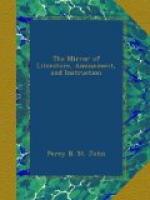"Ham. And now, good
friends,
As you are friends, scholars, and soldiers,
Give me one poor request.
Hor. What is it, my lord? We will.
Ham. Never make known what you have seen to-night."
“Let him, if he likes,” exclaimed a voice from the pit—“he’ll never see such a sight again.”—Then, in his instructions to the players, his delivery of them was accompanied by something like the following running commentary:
“Speak the speech, I pray you, as I pronounced it to you, (that is impossible!) trippingly on the tongue: but if you mouth it, as many of our players do, (laughter,) I had as lief the town-crier spoke my lines. * * * Oh, it offends me to the soul, to hear a robustious, periwig-pated fellow (like yourself) tear a passion to tatters, &c.—I would have such a fellow whipped (give it him, he deserves it) for o’erdoing Termagant. * * * Oh, there be players that I have seen play, (no, we see him,) and heard others praise, and that highly, (oh! oh! oh!) not to speak it profanely, that, having neither the accent of Christians, (ha! ha! ha!) nor the gait of Christian, Pagan, nor man, have so strutted (bravo! little ’un!) and bellowed, (hit him again!) that I have thought some of nature’s journeymen had made men, (who made you?) and not made them well, (no, you are a bad fit,) they imitated humanity so abominably.” (Roars of laughter.)
It was thus Mr. Henry Augustus Constantine Stubbs enacted Hamlet; and it was not till the end of the fourth act that he suffered a single observation to escape him, which indicated he thought any thing was amiss. Then, indeed, while sitting in the green-room, and as if the idea had just struck him, he said to Mr. Peaess, “Do you know, I begin to think I have some enemies in the house, for when, in the scene with Ophelia, I said, ’What should such fellows as I do crawling between earth and heaven?’ somebody called out, loud enough for me to hear him, ’Ay! what, indeed?’ It’s very odd. Did you notice it, ma’am?” he continued addressing the lady who performed Ophelia. “I can’t say I did,” replied the lady, biting her lips most unmercifully, to preserve her gravity of countenance.
This was the only remark made by the inimitable Mr. Stubbs during the whole evening, and he went through the fifth act with unabated self-confidence. His dying scene was honoured with thunders of applause, and loud cries of encore. Stubbs raised his head, and looking at Horatio, who was bending over him, inquired, “Do you think they mean it?”
“Lie still, for God’s sake!” exclaimed Horatio, and the curtain slowly descended amid deafening roars of laughter, and shouts of hurrah! hurrah!
The next morning, at breakfast, Stubbs found all the daily papers on his table, pursuant to his directions. He took up one, and read, in large letters—“THEATRE. FIRST AND LAST APPEARANCE OF MR. HENRY AUGUSTUS CONSTANTINE STUBBS IN HAMLET.”




